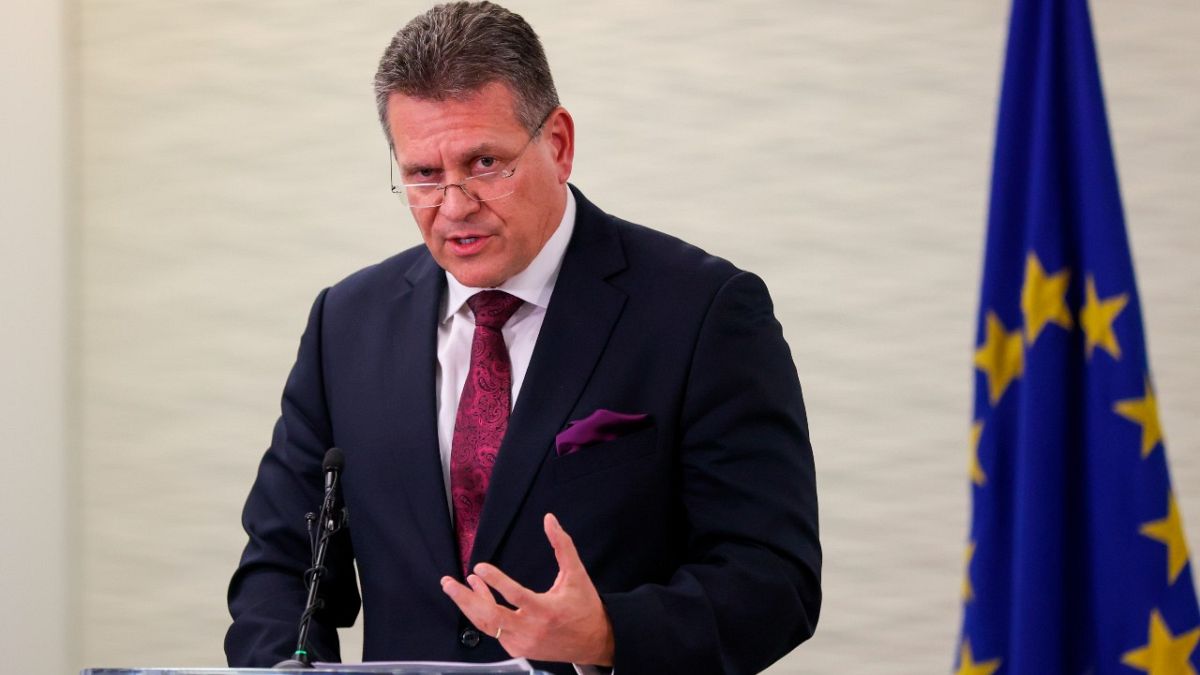EU and UK negotiators Maros Sefcovic and David Frost met in London and said talks will continue next week to try to settle the standoff on trading arrangements.
The British government and the European Commission are to continue talks next week to seek a solution over disputed post-Brexit arrangements for Northern Ireland.
The Commission's top negotiator Maros Sefcovic met his British counterpart David Frost in London on Friday, and said he welcomed the "change in tone" from the UK Brexit minister. Both say they will meet again next Friday in Brussels.
Some have detected a slight softening in position on the part of the Johnson government, which has repeatedly threatened to suspend parts of the agreement on Northern Ireland contained in the binding Brexit divorce treaty.
This would be done by invoking Article 16 of the Protocol, which allows either side to take unilateral safeguard measures in certain circumstances.
Frost said on Friday that "Article 16 safeguards were a legitimate part of the Protocol's provisions", in a government statement he published on Twitter. But there was no reference to the UK's intention to use it.
The minister said there "remained significant gaps to be bridged between the UK and EU positions". But, he added, the UK preferred "to find a consensual way forward".
Frost's comments echo those he made to the House of Lords earlier this week when he said Article 16 would only be invoked when negotiations had been "exhausted", and they were "certainly not at that point yet".
Sefcovic told a news conference after Friday's meeting that the EU had put "a lot of flexibility and creativity" into resolving problems concerning the protocol's implementation. Brussels was "working round the clock" to seek solutions to reduce customs red tape.
Both he and Frost identified the supply of medicines as a key issue, Sefcovic saying that maintaining an uninterrupted supply was "in everyone's minds".
After consulting businesses in Northern Ireland, last month the Commission published proposals for a large reduction in the number of checks on goods flowing from the British mainland to the UK territory.
Boris Johnson's government has set itself on a course of seeking a complete overhaul of the Northern Ireland Protocol, including scrapping oversight by the European Court of Justice (ECJ). This is despite the fact the deal was negotiated by both the prime minister and Frost two years ago.
It keeps Northern Ireland in the EU's single market for goods and subject to EU customs rules, resulting in an internal UK trade barrier with Britain — the so-called "Irish Sea border". The British government has extended grace periods to delay introducing checks.
However, the UK claims that the consequent trade disruption between Britain and Northern Ireland meets the terms set out in the Protocol for suspending its application.
London's threats to invoke Article 16 have prompted pre-emptive action in Brussels and Dublin in particular, which has said such a move could lead to the EU suspending the Brexit trade deal altogether.
The UK also cites unrest over the Protocol among unionist communities in Northern Ireland as another argument for suspending it — although its aim was precisely to preserve the 1998 peace accord.
In the United States, which was closely involved in the peace process, the House Foreign Affairs Committee warned the UK this week that its threat to invoke Article 16 threatened "that hard earned peace", calling on London "to abandon this dangerous path".


